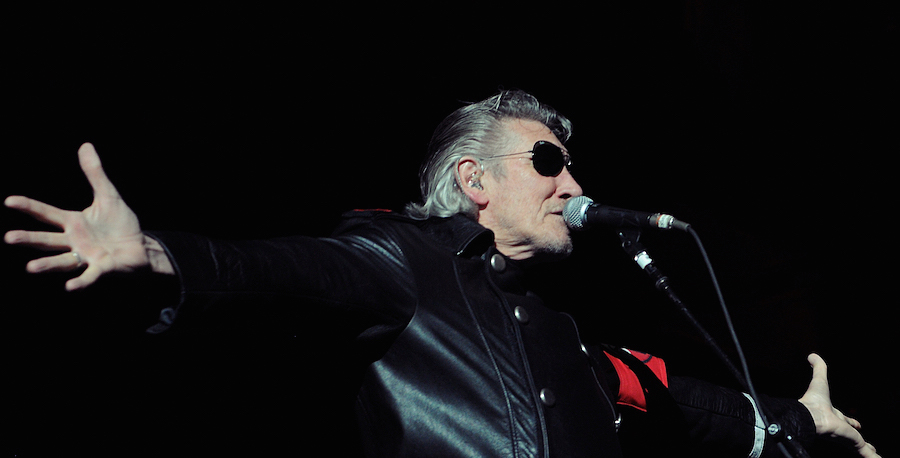An angel descended among us the other week — Thursday, October 26 to be exact, at St. Andrew’s-Wesley United Church in downtown Vancouver. He must have left his wings back in the hotel, but he shone out from the crowd, his righteousness, his focus and the elegance of his mind transforming his somewhat scruffy appearance. After all, why should an angel shave?
He was 74-year-old rock star Roger Waters, founding member of Pink Floyd and composer of many of the group’s best songs. He was nearing the end of a long cross-Canada tour called “Us + Them,” with a full band and backup singers and huge pig balloons, an old Pink Floyd prop. He had a bad cold, but — old pro that he is — he was able to talk above (or below) it, and his energy lit up the church’s cavernous interior.
Roger sat in a chair on the stage, between me, a Jewish woman writer in her 70s, and Itrath Syed, a much younger Muslim woman who teaches Women’s Studies and Communication Studies at Langara College and Simon Fraser University, and we tag-teamed him. We asked questions about his favourite subjects: social justice in Palestine/Israel, music, politics in general, and love.
“What do you say to people who tell you to leave politics out of your shows and just do music?” asked Itrath. “They’re just dumb,” responded the angel, going on to prove concisely that all art, all music is political. “People who say that just don’t agree with my particular politics.” Without ever using the term commodity fetishism he neatly divided the world into Haves and Have-Nots. “And if you look at all deeply into the arguments of people who tell you to leave your politics at the door, you’ll find them siding with the Haves.”
We asked Roger about his response to critics who call him antisemitic because he supports the Palestinian call for BDS (boycott, divestment and sanctions) against the government of Israel. “It’s the best way, totally nonviolent. The only way, really.” We asked him about difficulties he has faced in his professional life because of his politics. “Everyone faces difficulties.” We asked him about living in the United States under a Trump presidency. “He’ll be gone in three years. Let’s just hope he doesn’t do something really stupid in the meantime.”
His songs have always taken the side of justice. “You seem like someone who was born with a keen sense of right and wrong,” I said, asking him what can be done about people who don’t have that. “Education,” he answered. “Once you know the facts, all the facts, you can’t help but make the right choices.” And he told us about his mother, who was a Communist schoolteacher in Cambridge. “When I was little she used to bundle me up and take me to meetings.”
We asked him about a couple of songs from his new album, Is This the Life We Really Want? One of them, “Wait for Her,” is based on a poem by Mahmoud Darwish, the Palestinian poet, who in turn based it on passages from the Bhagavad-Gita. Itrath called it “a truly grown-up love song,” and Roger told us it was simply about love. “No politics at all, unless you realize that love is the key to everything. If we were truly capable of loving one another there would be no wars, no inequality,” said this Being, and I felt a surge in my heart, and maybe in all of the thousand hearts there in the audience. Because I realized long ago that for me there are three sources of joy: music, politics — the politics of justice — and love. The other song was “The Last Refugee,” and Roger said it was about hope, the hope that there will truly be a last refugee.
We knew from the videos available on YouTube that he would have articulate responses to anything we could throw at him, and he never repeated himself. Angels can do that, I guess — remember everything, stay present and switch up their responses.
I was angelstruck, gobsmacked, on another plane, and this is what I can reconstruct. We had a very brief question-and-answer period which he handled gracefully, and then he stood and received thunderous applause before leaving the stage. The thousand people who came to hear him looked different going out from when they came in, calmer, smoother, more radiant. He touched us all.
Martha Roth is a writer and editor and a founding member of Independent Jewish Voices Canada.
Photo: Brennan Schnell/Wikimedia Commons
Like this article? rabble is reader-supported journalism.




